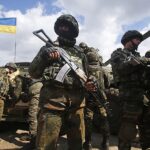Explosions signal a potential escalation in the Israel-Hezbollah conflict.
- Pentagon fears a potential ground war between Israel and Hezbollah in southern Lebanon.
- Recent explosions of electronic devices used by Hezbollah have heightened tensions.
- Israel has moved troops to the northern border, indicating a possible military escalation.
- U.S. officials are urging Israel to consider diplomatic solutions before escalating conflict.
- Hezbollah has vowed to retaliate against Israel for recent attacks.
The Pentagon is increasingly concerned about the possibility of a ground war erupting in southern Lebanon between Israel and Hezbollah. This worry has intensified following a series of deadly explosions involving electronic devices used by Hezbollah militants. U.S. Defense Secretary Lloyd Austin expressed fears that Israel might soon launch an offensive against Hezbollah, which has been engaged in ongoing rocket and air attacks. nnIn response to the escalating situation, Israel has repositioned a division of commando and paratrooper soldiers to its northern border. Although U.S. officials have not observed any immediate signs of an invasion, they acknowledge that Israel could initiate a smaller operation without significant military buildup. nnIsraeli officials have indicated that they are entering a new phase in their conflict with Hezbollah, demanding that the militant group withdraw its forces and cease cross-border attacks. The situation has already led to the evacuation of tens of thousands of Israelis from northern regions. nnDespite the rising tensions, U.S. National Security Council spokesman John Kirby emphasized the importance of pursuing diplomatic avenues to resolve the crisis. He stated that nothing is inevitable regarding a potential conflict. nnHezbollah has retaliated against Israel for the recent attacks, which have resulted in numerous casualties. The group has launched hundreds of rockets at northern Israel, targeting both military and residential areas. nnBoth sides are wary of escalating the conflict further, as the consequences could be devastating. The U.S. has positioned military assets in the region, including an aircraft carrier and additional air defenses, while also advising American citizens to leave Lebanon due to the heightened risk of violence. nnAs the situation develops, the Biden administration is preparing contingency plans for the evacuation of U.S. citizens and residents from Lebanon, highlighting the urgency of the situation.·
Factuality Level: 7
Factuality Justification: The article provides a detailed account of the escalating tensions between Israel and Hezbollah, supported by quotes from officials and factual information about recent events. However, it includes some speculative language regarding potential military actions and the situation’s future, which could be seen as slightly sensationalist. Overall, it maintains a reasonable level of factual reporting but could benefit from more clarity on the sources of information.·
Noise Level: 6
Noise Justification: The article provides a detailed account of the escalating tensions between Israel and Hezbollah, including specific incidents and responses from various officials. However, it lacks a deeper analysis of the long-term implications of these events and does not sufficiently hold powerful entities accountable. While it presents factual information, it does not offer actionable insights or solutions, which detracts from its overall value.·
Key People: Lloyd Austin (U.S. Defense Secretary), Yoav Gallant (Israeli Defense Minister), John Kirby (U.S. National Security Council spokesman), Antony Blinken (Secretary of State), Benjamin Netanyahu (Israeli Prime Minister), Amos Hochstein (U.S. special envoy), Patrick Ryder (Pentagon spokesman), Naim Qassem (Hezbollah’s deputy leader)
Financial Relevance: Yes
Financial Markets Impacted: The potential escalation of conflict between Israel and Hezbollah could impact financial markets, particularly in defense stocks and regional stability affecting oil prices.
Financial Rating Justification: The article discusses military tensions and potential conflict in the Middle East, which are significant factors that can influence financial markets, especially in sectors related to defense and energy.·
Presence Of Extreme Event: Yes
Nature Of Extreme Event: Armed Conflicts and Wars
Impact Rating Of The Extreme Event: Major
Extreme Rating Justification: The article discusses a series of deadly explosions in Lebanon linked to escalating tensions between Israel and Hezbollah, resulting in significant casualties (32 deaths and over 3,200 injuries) and the potential for a larger conflict, indicating a major impact on the region.·
Move Size: No market move size mentioned.
Sector: All
Direction: Down
Magnitude: Large
Affected Instruments: Stocks
 www.wsj.com
www.wsj.com 





